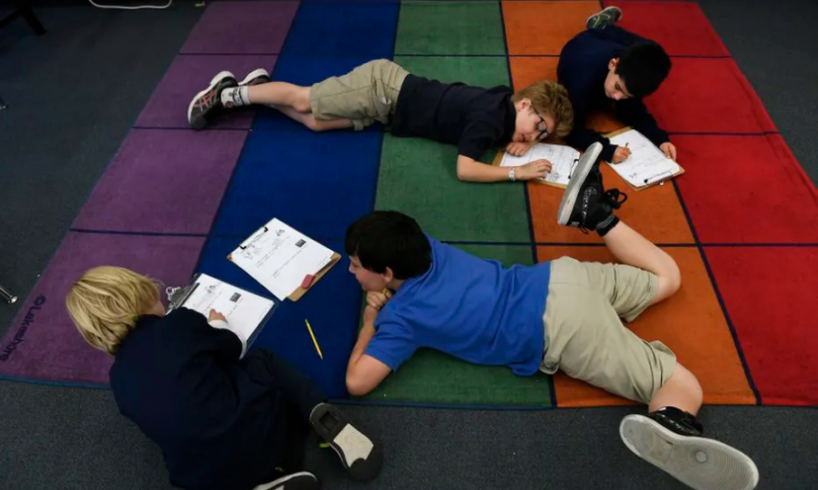
Denver’s first school board in recent history to be backed entirely by the teachers union renewed the district’s contracts with 16 charter schools Thursday, despite some members expressing concerns with the independent public schools.
Board President Xóchitl “Sochi” Gaytán was the only one of seven board members to vote “no” on renewing the charter contracts, though board Vice President Tay Anderson characterized his “yes” vote as a reluctant one. Board member Scott Baldermann voted for the renewals but said the board should undertake “a full review” of its charter renewal policy.
This was among the board’s first major decisions since three new members, including Gaytán, were elected in November. All seven members are now united in their criticism of education reform, a set of strategies favored by past school boards that included closing struggling district-run schools and expanding high-performing charter school networks. The teachers union has also been critical of charter schools, which are publicly funded but independently run.
But most board members spoke neutrally about charter schools Thursday, neither praising nor condemning them. They said they had faith in Superintendent Alex Marrero’s recommendations for renewing the charters’ contracts for periods ranging from two to five years depending on the strength of the schools’ academic performance, culture, and financial health (see box).
Several board members referenced Denver Public Schools’ declining enrollment, and thanked the charter school community for a recent commitment to participate in a districtwide process to develop criteria for when to close or consolidate small schools. Anderson said in an interview that he was planning to vote against some of the renewals but changed his mind after the charter schools agreed to participate in consolidation talks.
“For me personally, that was my line in the sand,” he said. “When I saw them make the good-faith effort to say, ‘We’re willing to come to the table,’ that says a whole lot for me.”
Denver schools are funded based on how many students they have. Previously, high enrollment made it easier to support a large number of schools, including new charter schools, but now Denver faces financial pressure to close small schools. While some charter schools already have closed because they had too few students, some community members have said it’s wrong to consider closing district-run schools without looking at charters through the same lens.
But the school board can’t close charter schools solely for enrollment reasons as it can with district-run schools. That decision is up to the charter schools themselves.
Carol Bowar is the founder of Girls Athletic Leadership School, a charter middle school in west Denver, and serves on the district-charter collaborative council, the group that made the commitment. She said the council had been talking for months about whether to participate in the consolidation talks, and that its recent agreement wasn’t directly related to the renewal votes, though charter leaders hoped the move would build trust with the new board.
So far, the charter schools have agreed to participate in a committee that would develop common criteria for when to close under-enrolled schools. They’ve requested that 23% of committee members come from charter schools given that 23% of Denver’s 90,000 students attend charters, and that all committee members understand how charters work.
“We hope that demonstrating our commitment to this district, to the family of schools of which we are a part, and to our work together to make all of DPS a great place for all of our students will enable you to vote for the recommended renewals with a greater peace of mind,” Bowar told the school board Tuesday during a special public comment session on the charter renewals.
For 3½ hours Tuesday, board members heard from students, parents, teachers, and principals asking that the board renew their schools’ charter agreements.
Eighth grader Lubombo Jedidia Kabeya talked about how her charter middle school, Compass Academy, treats students with care, kindness, and respect. She told the board about a time in sixth grade when she was sitting alone in the lunchroom and the dean came by.
“She sat next to me and asked me one question: ‘Are you OK?’” the eighth grader said. “No one at my old school had ever bothered to ask me that simple question. For the first time, I felt like I was finally wanted and needed in a community.”
Sahar Ebrahimy, an eighth grader at Girls Athletic Leadership School, said her teachers encourage students to use their voices, even if they’re reluctant at first.
“Everyone participates in our school, and everyone is seen and valued,” she said.
In voting against the renewals Thursday, Gaytán said she was not pushing back against the students and parents who love their particular charter schools. Instead, she criticized charter schools more generally, especially what she called the “corporatized charter networks” for siphoning students and funding from district-run schools, denying their teachers arbitration rights, and “not playing by the same rules as neighborhood schools.”
Gaytán said she grappled with how to vote, and she thanked her six fellow board members for voting yes so she could have the “safe space” to voice her frustration and vote no. If the Denver board were to have denied a charter school its renewal, the school could have appealed to the State Board of Education, which has been friendly to charters. But Gaytán said denying renewals, shutting down schools, and sending families scrambling is “not the answer right now.”
“This is not a board that is cruel and callous,” Gaytán said, “but rather a board that seeks to weave equity into the policy we write going forward. We’re all committed to doing the work to protect public education [and] to strengthen district-run schools.”
This article was originally posted on Despite concerns, Denver school board renews charter schools